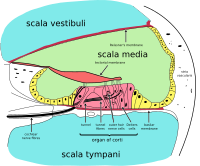
Photo from wikipedia
Introduction Hearing aids are the gold standard treatment to help manage hearing loss. However, not everyone who needs them has them, and of those who do, a significant proportion of… Click to show full abstract
Introduction Hearing aids are the gold standard treatment to help manage hearing loss. However, not everyone who needs them has them, and of those who do, a significant proportion of people do not use them at all, or use them infrequently. Despite literature reviews listing key barriers and enablers to the uptake and use of hearing aids, there is little evidence to describe how this varies by population and context. This review will describe what factors are important to whom in what context when considering the provision of hearing aids for hearing loss in adults. Methods and analysis The aims of this review are as follows: (1) To iteratively review and synthesise evidence surrounding the provision of hearing aids for hearing loss in adults. (2) To generate a theory-driven understanding of factors that are important, for whom, and in what context. (3) To develop a programme theory describing contexts that can support the provision of hearing aids to result in improved outcomes for adults with hearing loss. A scoping literature search will aid the development of programme theories, to explain how the intervention is expect to work, for whom, in what circumstances and in which contexts. We will locate evidence in the following databases: CINAHL, Cochrane Library, EMBASE, MEDLINE, PsycINFO, PubMED, Web of Science with no date restrictions. A realist analytic approach will be used to refute and refine these initial programme theories. Throughout the review, relevant key stakeholders (eg, patients and clinicians) will be consulted to test and refine the programme theories. Ethics and dissemination This study was approved by the University of Nottingham Faculty of Medicine and Health Sciences Research Ethics Committee: (FMHS 95-0820) and the London Brent NHS Research Ethics Committee (Ref: 21/PR/0259). The review will be reported according to the RAMESES guidelines and published in a peer-reviewed journal. PROSPERO registration number CRD42021282049.
Journal Title: BMJ Open
Year Published: 2022
Link to full text (if available)
Share on Social Media: Sign Up to like & get
recommendations!